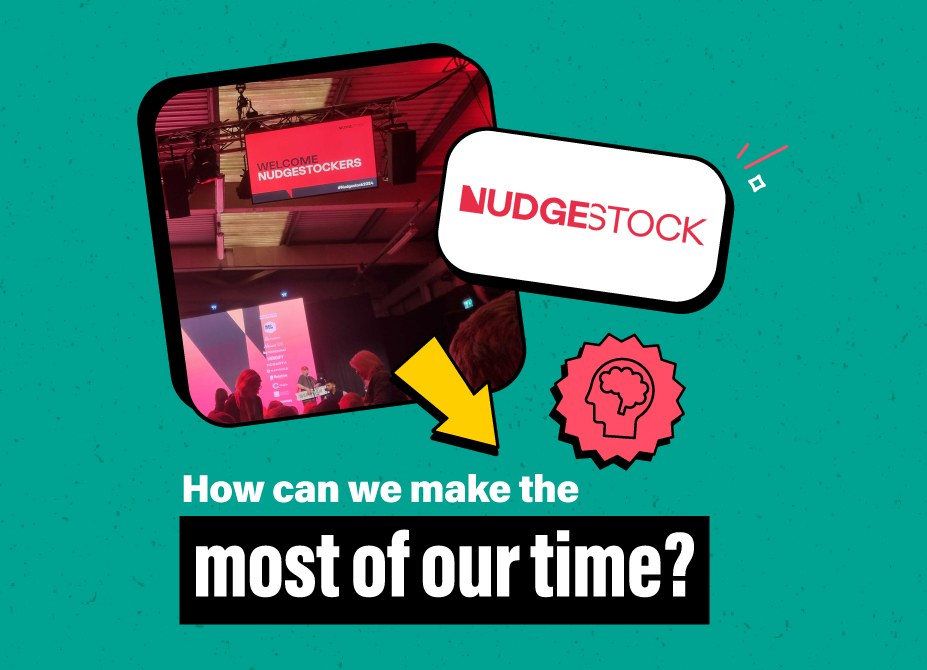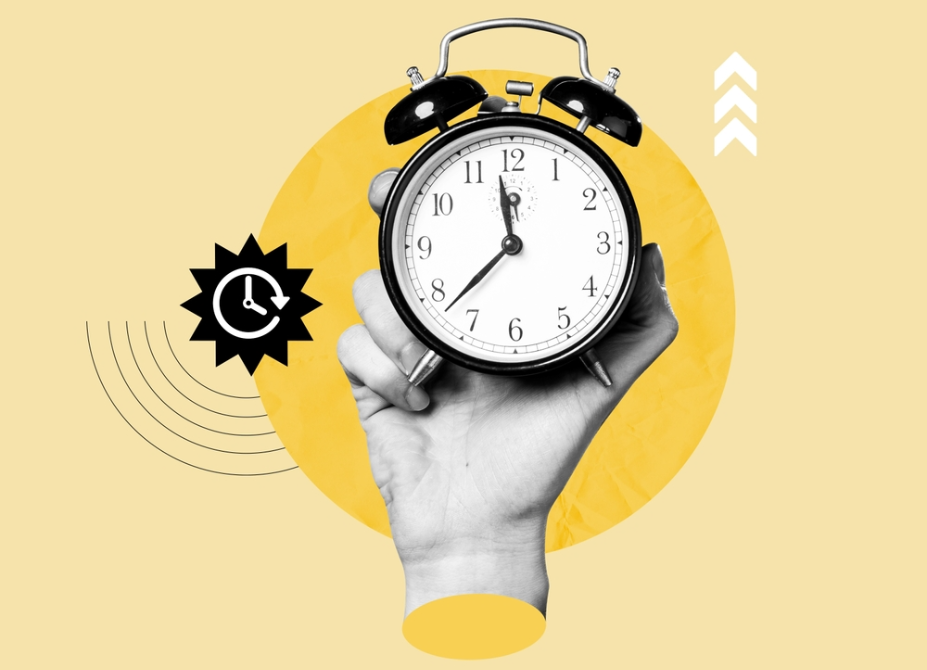Nudgestock is the world’s biggest festival of behavioural science and creativity, and it’s safe to say I was BEYOND excited (and nervous!). This year was all about TIME, how we use it and its untold influence on human behaviour. After having some time to digest all of the information, I’ve come up with five key takeaways that have relevance personally, professionally, and in the world of behaviour change.

1. We think doing things quickly is doing them efficiently
We live in a very fast-paced environment and feel that we need to meet everyone else’s expectations and get as much done as quickly as we can. We’ve convinced ourselves that by doing things quickly we’re being efficient, when it can actually mean the opposite from productivity.
Rather than taking the time to do things right, we try and get through our to-do lists as quickly as we can. But this list is never ending – there will always be something else to do. If we’re not taking the time to ensure things are being done properly, then they might come back around to bite us in the bum and need doing again, further exacerbating the never-ending list.
Take behaviour change as an example. Quick fixes aren’t fixes at all. You can’t solve the issue of smoking by showing everyone terrifying images of what it does to the body. Yes, it might put someone off for the meantime, but in the long-run you haven’t resolved the deeper reasoning behind their smoking behaviours and barriers to stopping. You haven’t disrupted the habit, you’ve just pressed pause.
2. We prioritise speed over enjoyment
In our efforts to prioritise speed, we’re forgetting about the importance of the journey. We think making the most of the time we have means doing as much as possible, and not about the quality of what we are doing and our experiences.
In the world of behaviour change, there is a risk of being so focused on doing something and doing it now that the most important ingredient is missed – understanding your audience. Implementing an intervention without understanding why people are behaving a particular way is like putting a plaster on a leaky pipe. It’ll work in the short-term, but as you’ve not targeted the underlying influences of behaviour, the plastered pipe will eventually go back to being a leaky one.
We need to think about the journey again, and practice what is preached by the phrase ‘quality over quantity’. Making the most of our time isn’t about doing as much as possible, it’s about enriching and maximising the opportunities we do have.

3. We’re too caught up in the today
The approach of getting through the never-ending to-do list as quickly as possible means we’re living for the day-to-day, and not the future. We’re thinking about what we need to do now and the immediate next steps, rather than considering where we want to be and build a plan of action to achieve that.
Did you know that thinking about ourselves in the future activates the same area of the brain as thinking about other people does? This means we do not relate to our future selves or even see this as us (mind bending, I know). This is probably why we focus so much on the now, we can’t imagine how we’ll get to the point of our future.
We need to take a step back and reprioritise. We need to think about where we’re at now, where we want to be in the future, and assess which items on the to-do list enable this, and which we need to let go.
4. We live in a time of anxiety
Ultimately, and perhaps unsurprisingly, this fast-paced ‘needs to happen now’ environment is a breeding ground for anxiety. Not only are we worried about the constantly expanding to-do list and whether we’ll actually get this done, but increased connectivity through social media means we can see what other people are doing and feel like we should be in the same place.
Seeing others travelling, reach relationship milestones and/or progress in their careers can make us feel like we should be doing more in these areas. These then get added to the now terrifying to do list, which feels increasingly impossible to finish. However, as cringe as the saying is, everyone is on their own timeline.
We need to stop thinking about what we haven’t done, and focus on what we have. We need to slow down, consider what’s important for us, and then take another look at that to-do list.
5. We need to embrace what we have (and what we don’t)
Time is limited, and always will be. We need to learn how we can shift our focus from the quantity of things we do to their quality. The to-do list is always going to be there and there will always be things left unfinished, that’s just the nature of life. The sooner we accept and embrace that, the sooner we can shift our thinking towards what is the priority, what needs doing and when can we do it.
Essentially, we need to ‘slow the f**k down’ (to quote one of the speakers) and reassess our priorities. By accepting that we have limited time, we can re-look at our to-do lists, whether they’re personal or professional, and consider what is actually important, when this can be planned in, and if it’s truly something we want or need to do.
At Social Change, we believe taking the time to truly understand your audience is the most important part of behaviour change. When done right, it’s the key to not only changing behaviour but doing so for the long-term. Unfortunately, quick fixes are just not sustainable. We need to stop thinking about how we can do things quickly and start looking to how we can do them properly.
Time is scarce. Use it wisely.

